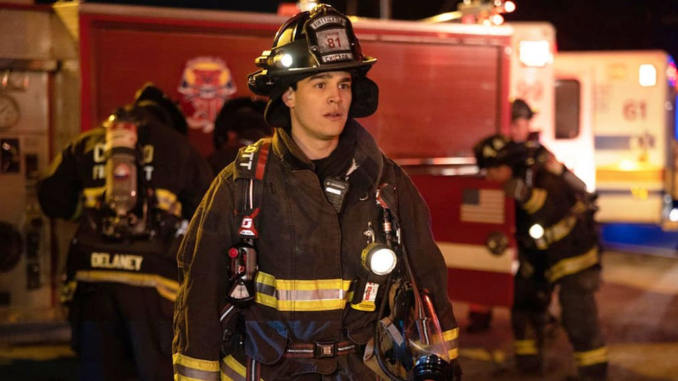
From Grief to Grave Concerns: Dermot Mulroney’s Portrayal Amplifies Fears for Chief Pascal in Chicago Fire
The recent episodes of Chicago Fire have seen Firehouse 51 grappling with the tragic and sudden death of Chief Dom Pascal’s (Dermot Mulroney) wife, Monica. While the initial worry centered around Pascal’s raw grief and how it might impact his leadership, the compelling and increasingly unsettling portrayal by actor Dermot Mulroney has amplified those concerns tenfold. Mulroney’s nuanced performance isn’t just depicting a man in mourning; it’s painting a picture of a leader teetering on the edge, potentially jeopardizing himself and his firehouse, making the impending return of Deputy Commissioner Boden (Eamonn Walker) in “Post Mortem” all the more fraught with tension.
A Chief Unraveling: Mulroney’s Masterclass in Grief and Instability
Since Monica’s tragic death in a car accident, Mulroney has delivered a powerful and heartbreaking performance as Chief Pascal. Initially, the concern was rooted in the natural empathy for a man who has suffered a profound loss. However, Pascal’s reaction has moved beyond typical grieving. Mulroney has skillfully portrayed a man consumed by anger, denial, and a desperate need to find someone to blame for an unforeseen tragedy.
His actions have become increasingly erratic and concerning. We’ve seen him irrationally focus his anger on the other driver involved in the accident, Robert Franklin, even threatening him. He’s brought the entire firehouse to the scene of the accident, demanding they find an alternative explanation, showcasing a refusal to accept the tragic randomness of the event. This isn’t just grief; it’s a potential descent into self-destruction and a clear indication that Pascal’s judgment is severely compromised.
“In the Rubble”: A Deep Dive into Pascal’s Precarious State
The episode “In the Rubble” served as a stark and unsettling showcase of Pascal’s deteriorating state. Mulroney’s performance was the episode’s anchor, portraying a man barely holding himself together. His return to work was less about professional duty and more about a desperate attempt to find solace or perhaps even an outlet for his rage. His decisions in the field became questionable, requiring his team to subtly rein him in, highlighting the danger his emotional instability poses to himself and his crew.
Mulroney masterfully conveyed Pascal’s internal turmoil, the conflict between his professional training and his overwhelming personal grief. The episode left viewers with a profound sense of unease, realizing that Pascal’s leadership was not just compromised but actively putting Firehouse 51 at risk.
The Looming Shadow of Boden: “Post Mortem” and the Accountability Factor
Against this backdrop of Pascal’s unraveling, the return of Deputy Commissioner Boden in “Post Mortem” takes on an even greater significance. Boden, a figure of unwavering authority and a staunch advocate for protocol and safety, is returning to investigate a disastrous firefight that occurred under Pascal’s command.
Given Pascal’s increasingly erratic behavior and questionable judgment in the wake of his wife’s death, the timing of Boden’s investigation couldn’t be worse for the current Chief. Mulroney’s portrayal in recent episodes has laid the groundwork for a scenario where Pascal’s grief has directly impacted his ability to lead effectively, potentially contributing to the tragic events Boden is now tasked with investigating.
Mulroney’s Performance: A Subtle Warning Sign
What makes Mulroney’s portrayal so impactful is its subtlety. He’s not just playing a caricature of a grieving man; he’s showing the slow, agonizing erosion of a leader’s composure and judgment. His interactions with the rest of Firehouse 51 are often strained, marked by moments of anger, denial, and a disturbing lack of self-awareness. This nuanced performance serves as a powerful warning sign to the viewers, indicating that Pascal’s struggles are far from over and could have serious repercussions for his future and the future of Firehouse 51.
The Potential Fallout: What Boden Might Uncover
With Pascal’s compromised state so vividly portrayed by Mulroney, Boden’s investigation in “Post Mortem” could uncover a multitude of issues stemming directly from the Chief’s emotional instability. This could include:
- Lapses in Judgment During the Firefight: Pascal’s grief could have clouded his decision-making during the emergency, potentially contributing to the tragic outcome.
- Violations of Protocol: His erratic behavior might have led to breaches in standard operating procedures, putting firefighters at unnecessary risk.
- An Unstable Leadership Environment: The overall emotional turmoil within the firehouse, stemming from both Monica’s death and Pascal’s reaction, could have created a less safe and effective working environment.
Boden, with his keen eye for detail and unwavering commitment to the well-being of his firefighters, is likely to recognize these signs of instability in Pascal.
Conclusion: Pascal’s Worsening State Amplifies “Post Mortem” Anxiety
While the return of Boden was initially a source of comfort for Chicago Fire fans, Dermot Mulroney’s compelling and increasingly worrying portrayal of Chief Pascal has significantly amplified the anxiety surrounding the upcoming episode “Post Mortem.” Mulroney hasn’t just shown us a grieving man; he’s depicted a leader on the verge of losing control, potentially with devastating consequences for himself and Firehouse 51. Boden’s investigation now carries the added weight of assessing not just the events of the firefight but also the fitness of the current Chief to lead. The stage is set for a potentially seismic shift within Firehouse 51, and Mulroney’s powerful performance has made the anticipation – and the fear – even more intense.